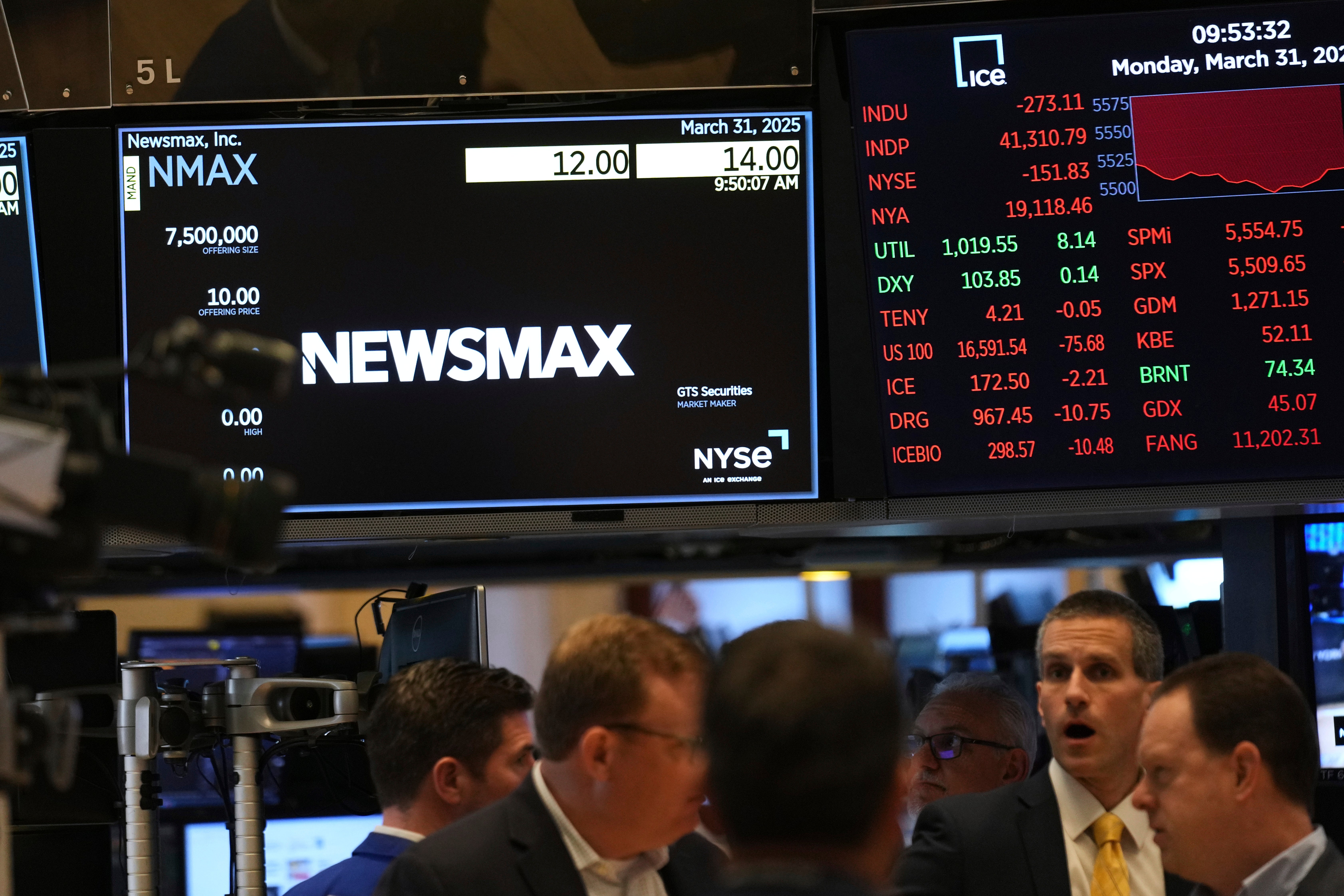Newsmax’s rollercoaster debut on the New York Stock Exchange continued on Wednesday when the network’s shares tumbled nearly 80 percent. The dive wiped out most of the short-lived gains that briefly gave the MAGA cable channel a market cap of $30 billion, surpassing Fox Corporation’s valuation by $5 billion.
The cratering of the share price on the network’s third day as a publicly traded company seemed to prove what investment experts warned following the stock price’s 2000 percent two-day surge: that Newsmax was nothing more than a “meme stock” and buyers should beware.
At the end of Wednesday’s trading, Newsmax shares had fallen to $52.52, a drop of over $180 from Tuesday’s close of $233, marking a loss of 77.5 percent. The network’s market valuation, based on 128 million fully diluted shares, now sits at $6.7 billion.
After kicking off its initial public offering at $10 on Monday morning, the stock began trading at $14 a share before it surged by nearly 800 percent on its first day, only to grow even more the following day – peaking at one point at $279 a share before settling at a still whopping price.

“Newsmax was listed on the New York Stock Exchange via a so-called Regulation A offering, instead of a traditional initial public offering,” CNBC noted on Wednesday after Newsmax’s rocky day. “Such an offering allows small companies to raise capital without undergoing the full U.S. Securities and Exchange Commission registration process. The primary focus is to sell to retail investors. In this case, it was sold to approximately 30,000 retail investors.”
Additionally, the volatility of the stock – which saw trading halted multiple times on Monday and Tuesday – was boosted by the fact that Newsmax had a relatively small “float,” which refers to the number of shares available for trading. Only 7.5 million shares were initially tossed out in the IPO, representing just six percent of total shares in the company.
Financial experts warned that the surging share price of the network, which posted a $72 million loss last year and is facing potential crippling legal liabilities in the upcoming Dominion Voting Systems lawsuit, had all the hallmarks of a “meme stock.” In fact, retail traders in online chatrooms were touting Newsmax this week as the “new GME,” referring to the speculative boom that GameStop experienced in 2021.
It was also compared to the media company launched by Donald Trump, perhaps the most famous of “MAGA meme stocks,” considering its brief market surge despite bringing in almost no revenue.
“This is like the initial market reaction to DJT on steroids,” said Interactive Brokers chief strategist Steve Sosnick. “This is the newest entry into the pantheon of meme stocks. Whether or not that persists, who knows, but it has all the hallmarks of a meme stock. There needs to be some sort of passion to enable investors overlooking fundamentals, and Newsmax fits that bill.”
After Tuesday’s jaw-dropping close, the price-to-sales ratio of Newsmax reached nearly 200, based on the network’s $171 million revenue in 2024. In comparison, Fox Corp – which brought in $15 billion last year – trades at 1.6 times its annual revenue. At the same time, while Newsmax has seen its ratings rise with Trump’s election, the network still draws just a tenth of Fox News’ average daily audience.
“With about one-tenth the ratings of FNC, one could argue for a value of [some] $2B for Newsmax, or about $16 a share,” investment site Seeking Alpha noted. “The company, though, is less profitable and earns lower advertising revenue given its older demographic and [there’s] likely some hesitance from brands to associate with it.”
Bloomberg, meanwhile, foretold that the bottom was likely to drop out of Newsmax after the stock price blew up on Tuesday.
“Just seven other stocks ended their debut sessions up more than 700 percent after a US IPO in the past five years, delivering returns to well-timed trades,” the publication reported.
It added: “Such firms have been losers in the long run, with shares of the average company in the group down nearly 94 percent from their IPO prices, crashing roughly 99 percent from their respective peaks.”




